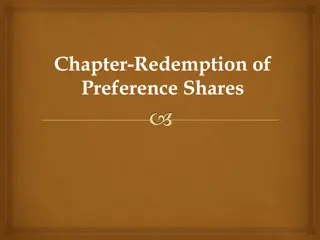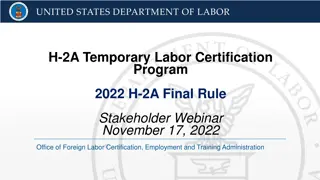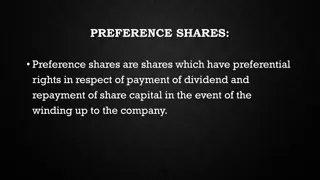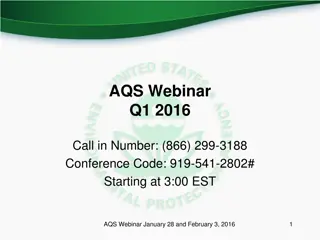
Shares and Securities in Company Ownership
Learn about shares, securities, and different classes of shares in a company. Discover how shares are issued, the types of shares available, and how share values are determined based on various factors. Gain insights into the importance of share management within a company structure.
Download Presentation

Please find below an Image/Link to download the presentation.
The content on the website is provided AS IS for your information and personal use only. It may not be sold, licensed, or shared on other websites without obtaining consent from the author. If you encounter any issues during the download, it is possible that the publisher has removed the file from their server.
You are allowed to download the files provided on this website for personal or commercial use, subject to the condition that they are used lawfully. All files are the property of their respective owners.
The content on the website is provided AS IS for your information and personal use only. It may not be sold, licensed, or shared on other websites without obtaining consent from the author.
E N D
Presentation Transcript
COMPANY SHARES DATE: 24 FEBRUARY 2025
What is a share? A share represents a unit of interest in a company. The number of shares and type of shares you own determines your level of control, ownership, and decision making within the company. 2
Difference between securities and shares Securities are tradable financial instruments with monetary value. They can take different forms including stocks and bonds, securities can represent an ownership interest or debt obligation of a company. They can also represent a right or obligation to buy or sell a specified asset at predetermined price in the future. A share refers to a unit of interest in a company and called stock or equity security which gives the owners interest on the underlying company. Bond is a debt security that represents money borrowed.
How must shares be kept by a company Step 1 When the company is registered, number of shares are indicated in the MOI (Called authorized shares) Authorised shares are shares that are available to be issued. Step 2 company issues the shares in different ways to investors (called issued shares) Company cannot issue more shares of a specific class than what is Authorised. Step 3 company can change share structure A resolution must be passed. For example, the company resolved to create redeemable preference shares to raise money. The directors will pass a resolution and agree on the rights attached to the class of Shares. The resolution must be registered with CIPC because it is an amendment of MOI. 4
Different classes of Shares What types of shares are available? Some examples below 1.Ordinary shares: These are the most common type and provide shareholders with equal rights to vote and receive dividends. 2.Preference shares: These give shareholders priority over others. For example, when it comes to dividend distribution but usually do not provide voting rights. 3.Non-voting shares: These do not grant voting rights but often receive dividends. 4.Redeemable preference shares: These can be bought back by the company at a predetermined price after a certain period. 5.Unspecified Shares: Shares created to be issued in future, the rights and preferences will be decided on later. 5
How is the value of the share determined Note that shares are created without value. The value of the shares is primarily determined by supply and demand. A company s performance might influence the share price. Investor perceptions and emotions can impact share prices. Factors such as interest rate, politics, inflation and economic growth also play a role. 6
How does a company use shares? If you are a shareholder, it does not mean that you are the owner of the company. Depending on the type of share you are holding, you can have voting rights or no voting rights. They can also use shares to raise money, like redeemable preference shares where the shareholders will only have voting rights if the resolution is applicable to the specific class of shares. Companies can involve employees and offer them shares as a reward but it will be shares with no voting rights. Company can use the profit to pay dividends depending on the type of shares (preference shares). Deciding to declare dividends will depend on the financial position of the company. 7
Sections of standard MOI on Shares In terms of Sections 36 and 16 of The Companies Act - the Authorised shares must be indicated in the MOI. MOI must set out the classes, the numbers of shares and the rights attached to the shares of the company. CoR15.1A is a standard short form of the MOI (Memorandum of Incorporation), it is applicable for a private company only. CoR15.1B is a standard long form of the MOI for all profit companies. If there is a change of shares, a special resolution must be passed by the share holders, or the directors of company and it must be registered with CIPC. 8
Administration of Authorised shares The administration of authorized shares depends on the type of company. Private and incorporated companies: Private and Incorporated companies are prohibited from offering Shares to the public and transferability of its shares are restricted. Keeping record of ownership and transfers is crucial and this include updating the company s share register. Public companies: On public companies the Shares are available to the public. It involves regulatory filings, setting a share price and listing on JSE. Maintaining accurate records of share ownership, transfers and transactions is crucial. Annual General Meetings(AGM) and shareholder meetings provide a platform for shareholders to decide and vote on key issues.
Administration of Authorised shares State owned companies: State owned companies are owned by the State. The government is the major shareholder. Transfers of state own shares often requires approval from relevant government authorities.
Share Register What is a share register? A share register is a summary of company s ownership. What is a security register? A security register is a summary of company s debt. Why a share register so important? It is a legal requirement in terms of companies act. Sec 50 It is a proof of ownership to protect the shareholders. Share register must be maintained by record or changes in shareholding as it happens, for example, change of shareholders. You will need the information in the share register to file beneficial ownership at CIPC. 11
Does NPCs have shares? NPC is a nonprofit company which does not have shareholders and does not issue shares or make profit. It only have directors with or without members. In case NPC is liquidated, then the assets will be transferred to another NPC which is for benefit of the public and not for the members. 12
Can a minor be a shareholder of company? Companies Act does not prohibit a minor to be a shareholder of company but there is legal restrictions such as, signing legal documents. A parent/guardian will act on their behalf handling voting rights and other shareholder responsibility. Family-owned private companies may allow minors to own shares through gifts or inheritance. 13






















